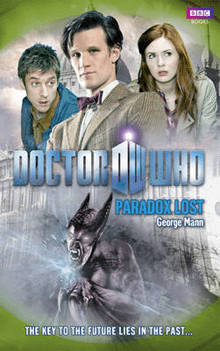 New Doctor Who novel ‘Paradox Lost’ is a fine representation of the series’ recent fascination with the more puzzling consequences of time travel.
New Doctor Who novel ‘Paradox Lost’ is a fine representation of the series’ recent fascination with the more puzzling consequences of time travel.
Yes, like much of Steven Moffat’s writing, ‘Paradox Lost’ is particularly concerned with predestination paradoxes, as the Doctor, Rory and Amy try to discover what connects a mysterious time ship in 28th century London with the appearance of the deadly Squall in 1910.
Unfortunately, it does this rather less well than Moffat or Jonathan Morris’ ‘Touched by an Angel’ novel. It’s not clear if the reveal of the paradox is supposed to be a surprise – the book is called ‘Paradox Lost’ after all – but you’ll figure it out way before the characters do, which always makes for an unsatisfying plot point.
For about half the book, the Doctor is in 1910 while Amy and Rory are in 2789. Keeping our main characters apart is an interesting, if hardly original, central concept, but there doesn’t seem to be any particular reason to do this aside from the necessitating of the extremely obvious paradox: once reunited the TARDIS team spent almost the entire time in 1910.
It’s a bit of a shame as 28th century London is a pretty fascinating setting and George Mann’s vision of a future city is very believable. Exploring more of it would have been nice, especially since Edwardian England feels like a more obvious setting for a Doctor Who adventure.
The separation also allows each party to have their own de facto companion, and again results are mixed. The improbably-named Professor Angelchrist is a great character in his own right: a retired English gentleman whose work for the British secret service means that he is, refreshingly, aware of the presence of aliens, and he really does add to the Doctor’s part of the story. The same cannot be said for 28th century android Arven, as the clichéd exploration of his humanity is somewhat marred by how anonymous he feels throughout the book.
Aliens, though, are the bread and butter of almost every Doctor Who story and in this respect ‘Paradox Lost’ does succeed. The Squall are a genuinely nasty race: they kill in an exceptionally gruesome way and are equally as menacing whether as a small group discovered by a burglar in a chilling opening scene or as a massed horde later on. Their presence as an effective threat is maintained throughout.
In the end, the main problem with the story is that it’s somewhat uneventful. Usually a writer uses a novel to expand on ideas or possibilities that couldn’t be covered in a TV episode but, conversely, ‘Paradox Lost’ feels like it would benefit from the snappier pace of the TV series. When one strips away the padding – such as the seemingly endless chases – it’s a remarkably straightforward story, especially given the name of the book. A real missed opportunity.
![]()
Published on Thursday 23rd June 2011 by BBC Books.

